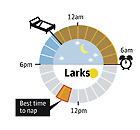 (above image from: Guardian article )
(above image from: Guardian article )
We still don’t know exactly why we sleep, but we do know we need a lot of it. Prisoners of war are often tortured by sleep deprivation. As are parents of newborns. The best explanation we have for our regular trips into unconsciousness is that it is a time when the brain runs its anti-virus software and reboots, re-calibrates its neural networks.
In short, sleep serves to maintain the integrity of our operating software AND hardware: the central nervous system.
More studies are emerging showing the very helpful nature of sleeping during the day. Increased mental acuity, immune function, pain management and long term mental health are being related to daytime naps.
And it appears a catnap won’t do the trick as well as a full blown siesta (although deep relaxation or cat naps are superior to no naps). In fact, functional MRI studies have even shown that 27 minutes of deep relaxation every day can change the density of certain areas of the brain. These changes coincided with improvements in anxiety in the control groups.
How Long Should I Nap?
We have 5 stages of sleep. Stages 1 through 4 and the mecca of all sleep journeys, REM. It takes 90 to 120 minutes to run through the whole 5 stage cycle. After which the body starts back at Stage 1 and repeats the process until we awake. Emerging conventional view on daily naps is that 90 minutes is a great idea. This allows one series of the full sleep cycle to occur.
Practically speaking, most of this article’s readers won’t be able to fit an hour and a half nap in. But you should do so as often as you can.
For those who’ll have to settle for 10-15 minutes of deep breathing in a relaxing place, the timing of the nap (or deep relaxation session) is the next most important goal. Depending on when you go to bed, you should nap at a strategic time of the day.
When Should I Nap?
As a rule of thumb, you should nap 6 to 7 hours after awaking in the morning. The following diagrams are from this article on nap time from the Guardian online magazine.
We have two natural “super sleepy” times during the day: between 2 and 4 AM and 1 and 3 PM.
So, as you see, if you’re early to bed you should nap around 1 PM. And if you’re a night owl, nap no later than 2.
Because if you nap later than the 1 to 3 PM sleep zone, you’ll have too much trouble falling asleep that evening.
And if you nap too early in the day, you’ll have trouble achieving proper sleep and will be too tired by bed time.
There is only a growing body of evidence in support of the total health benefits of mid day relaxation and naps. This is a health habit we can all get used to!
Sweet (day) dreams!!




